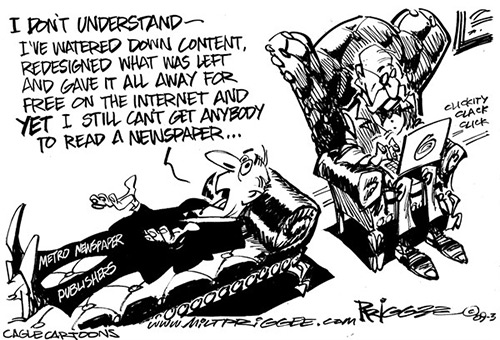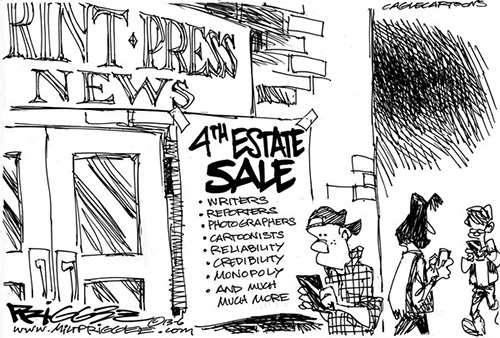
Newspapers Embrace Billionaire BuffsBy PETER FUNT
May 05, 2016
The most recent move was the purchase of Utah's largest paper, The Salt Lake Tribune, by the Huntsman family. The players are Paul Huntsman, son of billionaire Jon Huntsman Sr., and Paul's brother Jon Jr., the former governor and presidential candidate.
Newspapers
This is happening during a period of consolidation and desperation among established publishers. The Tribune Company, for example, is entertaining a bid for properties including the Los Angeles Times and Chicago Tribune from Gannett, owner of USA Today and dozens of dailies large and small. But while some deals are among corporate giants, an intriguing number now center on men like Huntsman and Adelson, who share a fondness for newsprint to the point of being billionaire buffs. They join the ranks of such rich and powerful men as Jeff Bezos, the Amazon chief who bought The Washington Post; John Henry, the Boston Red Sox owner who acquired The Boston Globe, and Glenn Taylor, majority owner of the Minnesota Timberwolves basketball team who purchased the Minneapolis Star Tribune. Each new owner pledged pretty much the same thing: the papers are returning to local control, no major changes are planned and, of course, news coverage will improve.
Media
This is all reminiscent of the first two-and-a-half centuries of American newspapering, beginning in 1704 with the nation's first successful paper, the Boston News-Letter. Not until the mid-1900s did individual and family control of a significant number of dailies give way to corporate chains. By the time newspapers reached a zenith of economic viability toward the end of the century, vast media conglomerates had become the dominant owners. Then, as we know all too well, the bubble burst in a flurry of Internet activity. With circulations plunging and ad revenues evaporating, chain owners looked to shed properties. Enter wealthy saviors and with them the question of which is the lesser evil for newspapers: callous corporate chains with excessive focus on the bottom line? Or, individuals with political agendas and an ownership fascination that might fade as quickly as it developed? When a small group of investors purchased the venerable Berkshire Eagle in western Massachusetts recently, one of the principals, banker Robert G. Wilmers, explained, "I've not been involved with newspapers except as a newspaper addict. I read five papers a day." Like many of us, the guy clearly loves print. Unlike most, he has millions of dollars to spend on what might be just an exotic hobby. Most of my colleagues who work at papers owned by cutthroat chains, such as Digital First Media — which off-loaded the Tribune in Utah and the Eagle in Massachusetts — are ready to embrace private individuals at the helm. They've suffered too long as jobs were outsourced and news coverage slashed. Maybe the return to individual ownership won't last long, if printed papers become too impractical, even for rich hobbyists. But for now, it's a welcome trend. Even worse than seeing any newspaper die is watching it slowly decay in the hands of greedy corporate owners.
Peter Funt is a writer and speaker. His book, "Cautiously Optimistic," is available at Amazon.com and CandidCamera.com. This column has been edited by the author. Representations of fact and opinions are solely those of the author.
|
||

